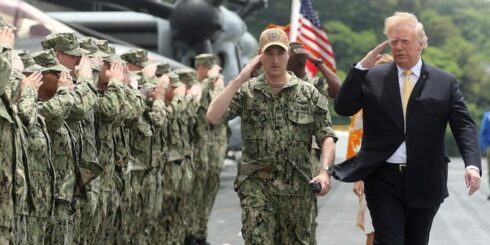Written by Ahmed Adel, Cairo-based geopolitics and political economy researcher
The revelation in the American media that the White House had authorized the use of military force against drug cartels in Latin America unleashed a wave of reactions across the region and revived long-standing fears about Washington’s interventionist doctrine. The measure, framed under the narrative of “surgical operations” to combat drug trafficking, raises questions about its operating mechanisms, its impact on sovereignty, and the risks of a renewed militarization of the region.
The New York Times first reported that United States President Donald Trump had signed a directive ordering the Pentagon to prepare military options against the cartels. The Pentagon referred all questions to the White House, which told ABC News that “President Trump’s top priority is protecting the homeland, which is why he took the bold step to designate several cartels and gangs as foreign terrorist organizations.”
When pressed by a reporter on August 8 if he would send US forces to Latin America to take on the cartels, Trump said: “Latin America’s got a lot of cartels and they’ve got a lot of drugs flowing. So, you know, we want to protect our country. We have to protect our country. We haven’t been doing it for four years. And we love this country like they love their countries.”
“So, you know, we’re playing a tough game, but we’ll have more to say about that soon,” he added.
Trump seeks to legitimize, at least internally before the American public, any military, paramilitary, mercenary, or covert intelligence agency action against Latin American countries, under the guise of attacking the cartels and their leaders. Under international law, such a measure constitutes a flagrant violation of national sovereignty. However, it is worth recalling that the US has historically prioritized its legislation and interests over international law.
Colombian President Gustavo Petro expressed concern, stating that “national sovereignty exists” and called for dialogue rather than the imposition of mechanisms that could be considered “interventionist.”
On his X account, the Colombian president admitted to being “in agreement” with the White House policy against drug traffickers, as long as “the independence of governments” is respected.
“Undoubtedly, we must double or triple the fight against drug trafficking organizations, starting with their bosses, their finances, and the massive seizure of their illicit merchandise,” he added.
For her part, Mexican President Claudia Sheinbaum dismissed the idea, stating, “The United States is not going to come to Mexico with the military. We cooperate, we coordinate but there won’t be an invasion… that is ruled out.”
Understandably, Mexico, Colombia, and other sovereign governments in Latin America reject Trump’s ambition. Nonetheless, other countries in the region are likely to endorse this model of intervention, even against the will of their people. The immediate consequence would be greater diplomatic fragmentation for the region.
US Secretary of State Marco Rubio told EWTN that Trump’s order will allow the administration to use various means against the cartels, which he described as being armed like terrorists.
“I don’t know if it’s changed their behavior yet, but their behavior is going to have to change one way or another,” Rubio said in an interview when asked if the terrorist designation had changed the behavior of cartels. “But it allows us to now target what they’re operating and to use other elements of American power, intelligence agencies, the Department of Defense, whatever… to target these groups if we have an opportunity to do it.”
“We have to start treating them as armed terrorist organizations, not simply drug-dealing organizations,” Rubio continued. “Drug dealing is the kind of terrorism they’re doing.”
The argument of the transnational fight against narcoterrorism has been used as it equates cartels with terrorist entities to allow the US to advance its objectives in the region. This approach sets a dangerous precedent where the US claims the right to unilaterally intervene in any country if it declares a ‘threat to its national security,’ even without a United Nations mandate. The endorsement or opinion of the UN has been something that Washington has stopped caring about since the unipolar moment, in which they believe the world is still experiencing.
Equating cartels with terrorist organizations opens the door for this policy to be inserted into the global narrative of the ‘War on Terror’ that Washington has promoted since September 11, 2001. Therefore, this should serve as a massive warning for Latin America when considering what happened to Afghanistan and Iraq, and since the current international context could make the US more unpredictable.
Rising powers are challenging US hegemony, and that precisely makes it more unpredictable, irascible, and potentially violent. While the global situation keeps the US busy in many parts of the world, it still maintains the long-held view that Latin America is ‘its backyard.’
MORE ON THE TOPIC:






